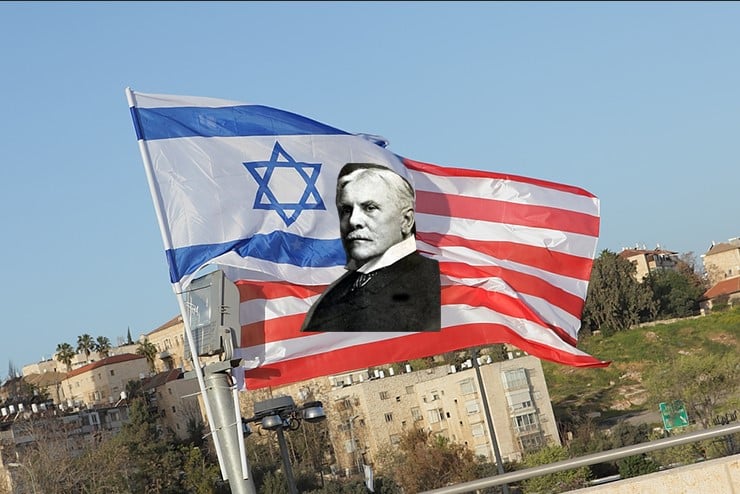In his Farewell Address, President George Washington warned Americans about “passionate attachments” to foreign countries. “The Nation, which indulges towards another … a habitual fondness,” Washington warned, “is in some degree a slave.” The Father of our country realized that unthinking attachment can quickly lead a republic “astray from its duty and interest.”
Although Washington likely had Great Britian and France in mind when he urged an America First foreign policy, we can benefit from his wisdom when applied to our current support of Israel in its war with Hamas. While no rational person can fault Israel for swift retaliation after Hamas’s cowardly Oct. 7 attack against noncombatants, the ensuing seven months of war and 35,000 civilian deaths in Gaza beg for a reassessment.
In May former U.N. Ambassador Nikki Haley proudly scrawled “finish them” on an Israeli artillery shell. Can anyone blame Gazan civilians for wondering whether Haley meant the message for them or Hamas fighters? Is it lost on her that the shell might just as likely hit a house as a bunker? It appears so.
Similarly, Senator Tim Scott (R-S.C.) proclaims that he is “a fan of Romans 13:4, that talks about the wrath of God” in relation to Israel’s enemies. He also advocates a foreign policy where “there is no daylight between the United States of America and Israel.” Consequently, many Palestinian civilians equate Israel’s actions with those of the United States and question what they have done to earn the enmity of the American people.
What is behind the unwavering for support of Israel from the likes of Haley, Scott, and so many other Americans? Bad theology wrought by dispensationalism in American Protestantism.
Dispensationalism is a recent theological program that traces its origins to John Nelson Darby (1800-1882), an Anglo-Irish minister connected with Plymouth Brethren (a low church nonconformist movement). Darby interpreted the Bible as recognizing two distinct peoples of God: Israel and the church. Prior to Darby’s influence, orthodox Christians believed that all of God’s promises were fulfilled in Christ. The ancient Hebrews looked forward to the coming of Christ whereas today’s Christians look back to Christ’s life, death, and resurrection. No matter which side of the first coming a person is born, redemption is based on Christ’s work. Consequently, orthodox Christians believed pre-Darby (and still believe today) that Israel and the church are one in Christ. They point, for example, to Paul’s teaching in Romans 11 where he describes the Gentiles as a wild olive shoot grafted onto Israel. Paul’s point, of course, is that there is only one olive bush that Jehovah tends and nourishes.
Dispensationalism gained steam through the “prophecy conference” movement and publication of the Scofield Study Bible in 1909, which contained myriad footnotes supporting Darby’s view of scripture. In its first 30 years, the Scofield Study Bible sold almost 2 million copies and became de rigueur in fundamentalist churches. Its influence on American Christianity was seismic. Cyrus I. Scofield’s work spawned Hal Lindsay (author of The Late Great Planet Earth), the Left Behind series focused on the “rapture” of the church, and Christian Zionism.
Related to the idea of two peoples is the dispensationalist view of eschatology (the study of the end times). In the words of Professor Stephen Wellum of the Southern Baptist Theological Seminary, “given the Israel-church distinction and God’s unchanging promise to Israel of living in the land ruled by the Davidic King (i.e., Jesus), dispensationalism affirms a distinct future for national Israel, tied to her national identity, in a future millennial age.” Hence, dispensationalists believe that God still has blessings to confer on the nation of Israel and that foreign policy offers American Christians an opportunity to further God’s cosmic plan. Many dispensationalists believe that the temple in Jerusalem must be rebuilt and the system of animal sacrifices reinstituted before Christ returns. Any threat to Israel and Jerusalem is seen in some dispensationalist circles as opposing the second coming.
The eschatology of orthodox Christians, on the other hand, views Old Testament prophecy as fulfilled in Christ and does not presume that national Israel has any relevance to God’s dealing with mankind. They consider Christ as the ultimate sacrifice to which the Old Testament sacrificial system pointed. Hence, they do not read the Bible to require (much less bless) reinstitution of the former types and shadows that directed God’s people (Jew or Gentile) to Jesus.
To be fair to dispensationalists, they are completely orthodox on the big question of Christianity as asked by the Philippian jailer: “Sirs, what must I do to be saved?” They would wholeheartedly echo the answer of Paul and Silas: “Believe in the Lord Jesus, and you will be saved, you and your household.”
But on eschatology and the place of national Israel, dispensationalism is out there. Dispensationalism’s influence on American Protestant Christianity explains the religious fervor with which Scott, Haley, and others support Israel. The bizarre teaching of Darby—alien to the ancient church and the Reformation—guides their obeisance to Netanyahu’s Israel. Scott and Haley no doubt believe that the Bible’s teaching trumps George Washington’s foreign policy advice. On this they are correct. But the real issue is whether the Bible to which they refer is the canon of scripture or the 20th-century annotations of Cyrus I. Scofield.

Leave a Reply